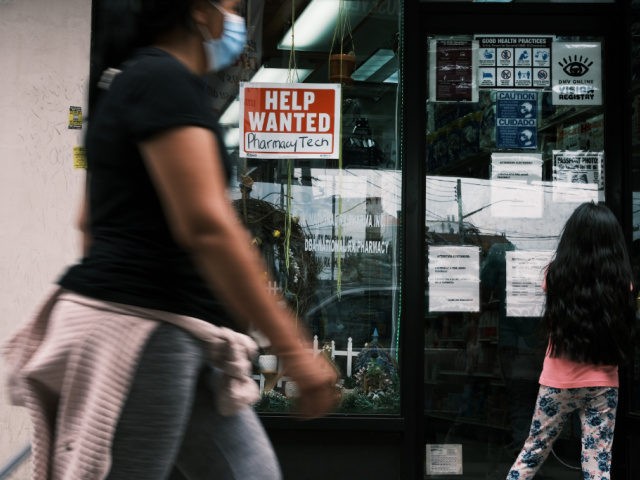Migration curbs set by former President Donald Trump are creating a labor shortage, the establishment-funded Axios.com news site complains.
“Immigrant and non-immigrant visas issued during the year ended October 2020 were down by nearly five million, or 54%, from 2019,” Axios’s June 17 report said, adding:
Almost all of this decrease can be tied to Trump administration decisions to close legal immigration [and visa worker] avenues in the pandemic’s early months, while also tightening rules and enforcement of undocumented immigration.
…
572,587 fewer people received temporary or permanent worker visas (H, L, O, P, Q, J, and E) in 2020, a 44% drop from 1.3 million in 2019.
But the Axios site was careful not to mention the subsequent pressure on CEOs to recruit American workers with fair-market offers of higher wages.
On June 10, for example, the Washington Post reported comments from Patrick Whalen, a co-owner of five restaurants in Charleston and Charlotte, North Carolina, who has long benefited from a bubble of cheap imported labor:
After one of his managers told him that a line cook needed to borrow money to get groceries, Whalen was moved to reconsider wages at the company.
“It was just one of those moments where you just kind of stop and you say, ‘Is there a real problem in our industry?’” he said. “We always kind of knew it was there, but we didn’t really know what to do with it.”
The company raised the starting wage for all of its staff to $15 an hour, up from $12 to $13. And it created a “tip the kitchen” program, adding a second line to table checks for gratuity for the back-of-the-house staff, which the restaurant matches up to $500 per night. That move has increased wages for non-tipped employees such as line cooks and dishwashers to an average of $23.80 an hour, Whalen said.
Axios is part-owned by Laurene Powell Jobs, who also funds pro-migration advocacy groups.
In a June 18 email, the Republican National Committee mimicked Axios’s careful silence about the link between lower migration and higher wages. The RNC email, instead, portrayed the claimed worker shortages as a problem that was created by President Joe Biden, saying:
Joe Biden and the Democrats are putting small businesses between a rock and a hard place.
Small businesses are struggling to compete for workers as Biden pays people not to work. Almost half of small business owners are having “real problems” finding workers amid labor shortages at the “highest levels” business experts have ever seen.
The linked RNC tweets also included a video in which a CNBC anchor suggested that “employers are going to have to start paying a lot more money to get people to work.”
Many workers nationwide are benefiting from Trump’s curbs on the federal supply of cheap labor to CEOs and investors.
For example, meatpacking workers in the Great Plains gained when Trump’s policy forced their employers to invest in automation and to raise pay. That was a big change in the low-profit, low-tech sector, which has been flooded with cheap workers delivered via the government’s border and refugee policies.
On June 9, JBS Foods reported it was spending $280 million to upgrade its facilities and to raise wages:
JBS USA has invested $130 million to increase production capacities at two of its major beef processing facilities in Grand Island and Omaha, Neb. … These expansions will increase processing capacity by nearly 300,000 head of cattle per year, providing increased access and opportunity for the more than 1,100 local cattle producers who support the facilities.
…
To ensure consistent access to a skilled workforce, JBS USA has also provided more than $150 million in annualized wage increases over the last twelve months. … Today, the average wage for JBS USA hourly beef team members is more than $22.00.
The deep public opposition to labor migration is built on the widespread recognition that legal and illegal migration moves money away from most Americans’ pocketbooks and families.
Migration moves money from employees to employers, from families to investors, from young to old, from children to their parents, from homebuyers to investors, from technology to stoop labor, from red states to blue states, and from the central states to the coastal states, such as New York.

COMMENTS
Please let us know if you're having issues with commenting.